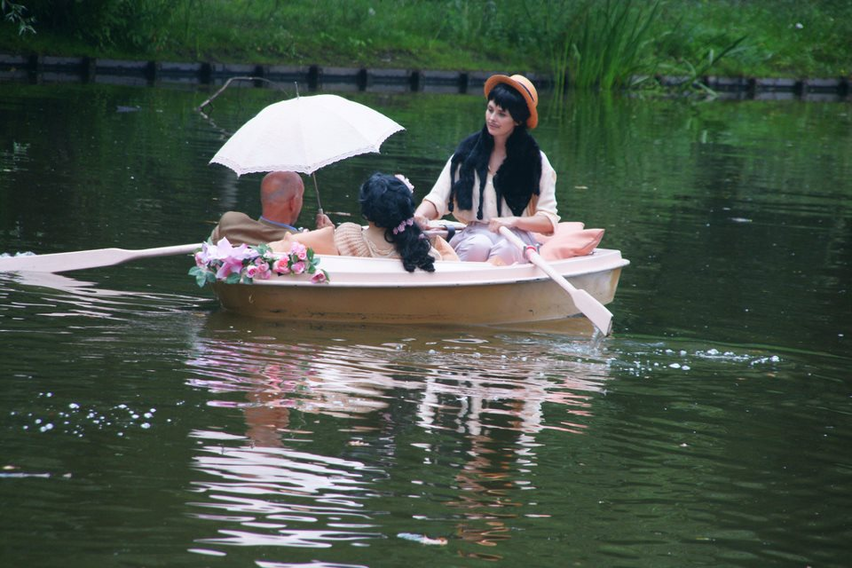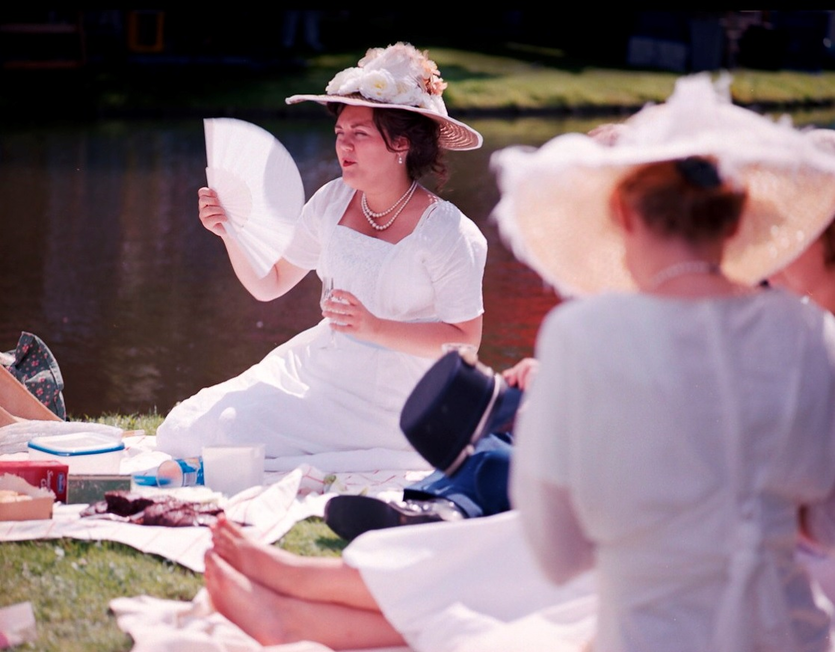The musical programme of the DRM is varied. Visitors can listen to performances at various podia throughout the park such as the J.O.N.G. Ensemble and the Doelen Ensemble. In order to retain the visitor's attention and create an authentic festival atmosphere, short pop-up concerts take place throughout the park at various time slots. During these surprise concerts, guests tend to not listen attentively to the performances. In order to facilitate different modes of listening, silent zones are established near the large podia. While it is difficult to maintain absolute silence in these zones, volunteers and even visitors try to call attention to someone's behaviour. Additionally, some of the stages are equipped with amplifiers. Aside from bringing Romantic music, the organisation also emphasizes Romantic values, such as love, friendship, respect for nature, art and emotions. A wall of poetry serves as a display for renowned Romantic poets and also showcases visitors' poems. Special stands provide traditional food and beverages to the visitor, for instance, tea containing ingredients found in Het Park.
The media coverage on the DRM strongly highlights and emphasizes the festival's civilized, cozy atmosphere and centralizes the decor of Het Park, the Romantic outfits and classical music. Headings such as "Ascot in the park" (Rotterdam, 2013), "Enjoyment with style" (Genieten, 2013) "Wine, hats and music" (Keunen, 2013) indicate that the DRM combines many different elements and activities ultimately all connected to the process of musicking. Moreover, the festival serves as a location to meet friends and acquaintances. Media accounts of the DRM strongly highlight the festival's social component by featuring stories of friends dressing up together and making visits to the DRM an annual tradition and guests taking pictures of exquisitely dressed festival goers. A comparison of the media coverage on other classical music festivals such as the Prinsengrachtconcert reveals a crucial difference: These articles are solely focused on the classical music, the works, the composers and the ensembles and the transcendent experience of listening to these works; a rather narrow portrayal of the event by solely focusing on music as an abstract object and the one-sided communication from the performers to the musical experience taking place on an individual level through the process of internalization (Abrahams, 2013; Don, 2013).
Although the organisation is not aware of the history of eighteenth-century pleasure gardens, the similarities between these venues and the DRM are striking. First, the location of the park serves as a stage for the event; a decor that aids in enabling the creation of a fantasy world. Both the pleasure gardens and the DRM are perceived as an event or venue to meet acquaintances and friends to enjoy music, cuisine and drinks. The spectacle of seeing and being seen is another striking similarity, although this spectacle takes a different form in the twenty-first century where visitors can shamelessly observe and admire one another and take pictures of other guests. While both pleasure gardens and the DRM imply social inclusivity, this notion is contestable. A careful examination of the behaviour of the elite classes in pleasure gardens makes it evident that social mingling was not a common practice in these venues. The DRM may be different in this regard, yet the audience survey shows that the majority of the festival's visitors has followed a higher education, which raises questions about the social diversity of the festival's public.
The Dag van de Romantische Muziek (DRM) is an annual free open-air festival in Rotterdam, geared towards Romantic classical music. This 'Dutch Ascot in the park' attracts tens of thousands of visitors each year. Guests often dressed in nostalgic attire, promenade around Het Park, meet friends, listen to music and typically enjoy a picnic under the trees. The Glyndebourne Festival Opera inspired Dorine de Vos, founder of the DRM, to organise a similar event in Rotterdam (Keunen, 2011). The English opera festival has been an annual event since 1934, during the intervals between performances, exquisitely dressed visitors typically enjoy a picnic on the lawns of Glyndebourne's country house. After the 25th edition of the DRM in 2011, the festival's organisation Stichting Buitengoed faced financial hardships and turned over the event's organisation to Stichting CultuurBrigade. Hans Mosselman, director of the CultuurBrigade, and his partner Frank had just set up their foundation and as fans of the outdoor festival took it upon themselves to save this event from extinction. While their first turn in organising the DRM was successful, the financial losses were still considerable. By combining the DRM with a new culinary event, Park Proeven, the festival started to bounce back from the financial losses. Following the success of the combination of the DRM with Park Proeven, the 28th edition of the festival will take place on August the 24th 2014 in HetPark in Rotterdam.
The location of the event suits the overall festival's theme. Het Park in Rotterdam opened in 1852, designed as an English garden by garden architects Jan David Zocher jr. and his son Louis Paul Zocher. The park has a long history of musical performances, as Franz Liszt performed here in 1854 during an international music festival. The organisation aspires to re-create and maintain the nineteenth century atmosphere by preventing interventions in the landscape as much as possible. The architecture and history of the location contribute to the festival's atmosphere which, according to Mosselman, can be best described as sweet and civilized: "When you see how people interact with each other, it gives me some hope for this world. It's a soft festival in a hard city. And we need that romance, especially in Rotterdam, but also in our society in general" (H. Mosselman, interview, May 16, 2014).
One of the organisation's main aims is that the festival is accessible to a broad audience. By keeping the admission to the event free, Stichting CultuurBrigade aspires to provide guests with the opportunity to become acquainted with classical music in a recreational setting. In a sense, Mosselman hopes that the festival serves as an intermediary step towards the appreciation of classical music and attendance of classical concerts in more formal settings such as De Doelen in Rotterdam or the Concertgebouw in Amsterdam. According to Mosselman, younger generations often experience difficulties in remaining focused for a long time during classical concerts in the concert hall as they are used to receiving multiple stimulants at once. By combining classical music with the decor of Het Park, a Romantic atmosphere and a full program with diverse forms of entertainment, the organisation hopes to attract, as Mosselman dubs it, the ADHD generation as well. Mosselman continues that in spite of the music being the key element of the festival, the majority of the visitors attend the DRM for the pleasant atmosphere and overall festival experience.
The festival's varied entertainment programme annually attracts approximately 35.000 visitors; a varied public, spanning several age classes, young couples, families and their children. An audience survey conducted in 2009 shows that the largest number of respondents (51.2%) stated that the 'gezelligheid' was the main reason for attending the festival, in contrast to 5.9% of the respondents attending the DRM for the overall festival program. It is striking that the majority of the respondents (54.4%) has followed an HBO or university education. As admission to the event is free, it would be reasonable to assume that the festival's audience would represent diverse backgrounds in terms of education. Furthermore, the respondents stated that the most important aspects of the event were: the atmosphere (84.7%), location (65.5%), program (36%) and the type of visitors the festival attracts (37.9%) (Meijer, 2009).

